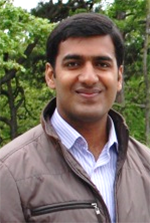
Energy Storage and Industry 4.0: Challenges and Prospects
(ENSTIN 2019)
31 July – 2 August 2019; KwaMaritane Bush Lodge, Pilanesberg National Park, South Africa
Plenary Speakers
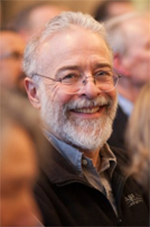 |
Prof Héctor D. Abruña
|
Professor Abruña, Emile M.Chamot Professor of Chemistry is Director of the Energy Materials Center at Cornell (emc2). He completed his graduate studies with Royce W. Murray and Thomas J. Meyer at the University of North Carolina at Chapel Hill in 1980 and was a postdoctoral research associate with Allen J. Bard at the University of Texas at Austin. After a brief stay at the University of Puerto Rico, he moved to Cornell in 1983. He was Chair of the Department of Chemistry and Chemical Biology from 2004-2008. Prof. Abruña has been the recipient of numerous awards including a Presidential Young Investigator Award, Sloan Fellowship, J. S. Guggenheim Fellowship and J. W. Fulbright Senior Fellow. He is the recipient of the Electrochemistry Award for the American Chemical Society (2008), and the C.N. Reilley Award in Electrochemistry for 2007. He was elected Fellow of the American Association for the Advancement of Science in 2007, member of the American Academy of Arts and Sciences in 2007 and Fellow of the International Society of Electrochemistry in 2008. He recived the D. C. Grahame Award from the Electrochemical Society for 2009 and the Faraday Medal of the Royal Society for 2011 and the Brian Conway Prize from the International Society of Electrochemistry for 2013. In 2013, he was made Fellow of the Electrochemical Society. Prof. Abruña is the co-author of over 440 publications and has given over 575 invited lectures world-wide. Out of the 50 students that, to date, have obtained a Ph.D. under his direction, 14 have gone on to faculty positions. |
|
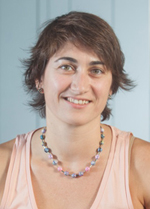 |
Dr. Montse Galceran Mestres |
Montse Galceran is chemist, with a strong background on the synthesis, structure and microstructure characterizations of new materials. She has more than fifteen years of experience in the interdisciplinary and multidisciplinary field of materials science. Her research has been focused on improving the understanding of material properties through a multi-technique approach. She combines material development with wide number of characterizations techniques, applying this approach to materials for different applications. Finally, she focusses her efforts on the energy storage due to the importance that it has to achieve sustainable development. She has carried out her research activities in many recognized research center and universities around the world (Belgium, Germany, Poland, Brazil, and Canada). Currently, she is the research line manager of sodium ion batteries at CIC energiGUNE (Spain), where her research focus on the development of electrode materials for Li-ion and Na-ion batteries. |
|
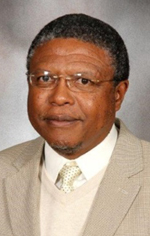 |
Prof Phuti Ngoepe |
Phuti Ngoepe obtained his first degree at the University of the North (now University of Limpopo) and completed a PhD in Physics at the University of Witwatersrand. He spent sabbatical at the University of Keele, UK where he commenced with work on computational modelling of materials. He is Professor of Physics at the University of Limpopo and Director of Materials Modelling Centre and holds a SARChI Chair in Computational Modelling of Materials. His research activities range from electronic to nano scales and cover energy storage, mineral processing and alloy development. He has worked with local and international collaborators – in the UK, USA, France and Japan. He has produced several publications in this field, including chapters in two books, and presented invited papers at local and international conferences. He has supervised many honours students and up to 40 MSc and PhD students and several are currently studying under his guidance. He has also contributed significantly to science policy formulation in South Africa. He is a member of several science societies and Founder Member of the Academy of Science of South Africa. Amongst honours bestowed on him are the National Science and Technology Forum award, National Research Foundation Presidential award, National Order of Mapungubwe Silver. |
|
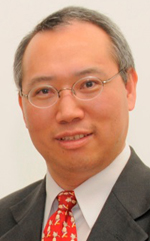 |
Prof. Aicheng Chen | |
Aicheng Chen is a Professor of Chemistry, Director of the Electrochemical Technology Centre at the University of Guelph, and Senior Canada Research Chair in Electrochemistry and Nanoscience. He received his MSc from Xiamen University under the supervision of Prof. S.-G. Sun and his PhD in Electrochemistry from the University of Guelph in 1998 under the direction of Prof. J. Lipkowski. Subsequent to working in the chemical industry as a Research Scientist and Electrochemical Specialist for four years, Chen joined Lakehead University in 2002 as an Assistant Professor, where he was promoted to Associate Professor in 2005, Canada Research Chair in 2006, and Full Professor in 2010. He relocated to the University of Guelph in 2017. Chen’s research interests span the areas of electrochemistry, green chemistry, biorefining, materials science, and nanotechnology. He has published over 200 journal articles and book chapters with ~10,000 citations and an h-index of 56. In addition, Chen has authored/co-authored over 100 industrial technical reports. He served the International Society of Electrochemistry as the Canada Regional Representative and served the Electrochemical Society Canadian Section as Secretary, Vice Chair, Chair and Councilor. Chen has been Associate Editor of Canadian Journal of Chemistry since 2013 and Editor of Electrochimica Acta since 2016. |
|
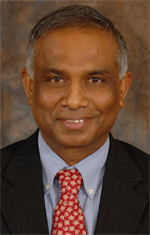 |
Prof Arumugam Manthiram Cockrell Family Regents Chair in Engineering |
Arumugam Manthiram is currently the Cockrell Family Regents Chair in Engineering and Director of the Texas Materials Institute and the Materials Science and Engineering Program at the University of Texas at Austin (UT-Austin). He received his Ph.D. degree in chemistry from the Indian Institute of Technology Madras in 1981. After working as a postdoctoral researcher at the University of Oxford and at UT-Austin with Professor John Goodenough, he became a faculty member in the Department of Mechanical Engineering at UT-Austin in 1991. Dr. Manthiram’s research is focused on clean energy technologies: rechargeable batteries, fuel cells, and supercapacitors. He has authored more than 740 journal articles with 52,000 citations and an h-index of 114. He directs a large research group with about 30 graduate students and postdoctoral fellows. He has provided research training to more than 200 students and postdoctoral fellows, including the graduation of 58 Ph.D. students and 25 M.S. students. He is the Regional (USA) Editor of Solid State Ionics, Co-Editor of Ceramics in Modern Technologies,and an Associate Editor of Energy and Environmental Materials. Dr. Manthiram is a Fellow of six professional societies: Materials Research Society, Electrochemical Society, American Ceramic Society, Royal Society of Chemistry, American Association for the Advancement of Science, and World Academy of Materials and Manufacturing Engineering. He received the university-wide (one per year) Outstanding Graduate Teaching Award in 2012, the Battery Division Research Award from the Electrochemical Society in 2014, the Distinguished Alumnus Award of the Indian Institute of Technology Madras in 2015, the Billy and Claude R. Hocott Distinguished Centennial Engineering Research Award in 2016, and the Da Vinci Award in 2017. He is a Web of Science Highly Cited Researcher in 2017 and 2018. |
|
Keynote
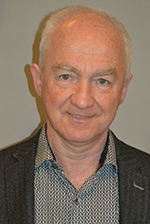 |
Daniel Bélanger Téléphone: 514 987-3000 poste 3909 |
Daniel Bélanger is currently Professor in the Département de Chimie de l’Université du Québec à Montréal. Daniel Bélanger obtained a BSc in Chemistry at the Université du Québec à Trois-Rivières, a MSc in Chemistry at Université Laval, and a PhD in photoelectrochemistry in 1985 under the supervision of Jean-Pol Dodelet at the Institut National de la Recherche Scientifique (INRS). He then worked as a postdoctoral fellow at the Massachussets Institute of Technology (MIT) with Mark S. Wrighton, before joining the Université du Québec à Montréal (UQAM) in 1987 as an assistant professor. His current research interests in the area of electrochemistry include chemical and electrochemical modification of surfaces, electrode materials for electrochemical energy storage systems and electrolytes. He has published over 185 publications, which have cited more than 14500 times (h-index= 54, Scopus). For more information: (click here). He is an Associate Editor (Power Sources) for Electrochemistry Communications (Elsevier).
|
|
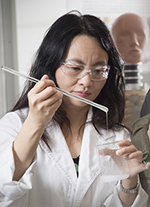 |
Dr Jie Ding |
Defence Scientist Jie Ding has developed an innovative approach to the very heart of the battery, creating a new class of electrolytes that harden upon impact. This was only made possible by a discovery Jie made about a material that combines the advantages of both liquid and solid electrolytes. |
|
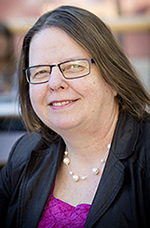 |
Prof Kristina Edström |
Prof Kristina Edström, spearheads the largest battery research group in the Nordic region – Ångström Advanced Battery Centre (ÅABC). The research deals with all aspects of lithium batteries and the chemistry of fuel cells: Cathode, anode and electrolyte. The applications are primarily in electric vehicles, micro-batteries and lithium-air batteries. Today, Kristina Edström’s main focus is on guiding promising young researchers at the Ångström Laboratory. Her battery group recently received SEK 27 million from the Battery Fund, a research and development programme focusing on battery reuse and recycling, and on vehicle batteries, run jointly by the Swedish Energy Agency and the Swedish Environmental Protection Agency. |
|
Invited Speakers
|
Dr Qamar Abbas |
Dr Qamar Abbas is a senior researcher and leader of Lise Meitner project at the Institute for Chemistry and Technology of Materials, Graz University of Technology (TU Graz), Austria. He is a specialist in designing new electrodes and electrolytes, and possesses extensive experience in fabrication and testing of energy storage devices. His focus is on the designing of eco-friendly hybrid electrochemical capacitors where one carbon electrode works as battery-like and the other one as capacitor-like, while the resulting hybrid capacitor exhibits symmetric charge/discharge characteristics similar to an electric double-layer capacitor (EDLC). |
|
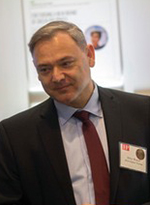 |
Dr. Artur Braun |
Dr Artur Braun is a Physicist with a PhD in electrochemistry, working as research group leader at the Laboratory for High Performance Ceramics, EMPA-Swiss Federal Laboratories for Materials Science and Technology in Switzerland. His research is focused on ceramic energy materials for fuel cells, gas sensors, batteries, and photoelectrochemical cells (solar fuel cells), for which he was awarded a Marie Curie Fellowship by the European Commission. Currently, Artur leads the SUNRISE Project under the EU FET H2020 funding platform which is aimed at decarbonizing the atmosphere by using CO2 and H2 to produce solar fuels, chemicals and fertilizers. SUNRISE is a European project, it has supporters from associated countries, including South Africa. |
|
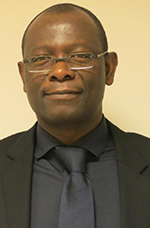 |
Prof Kouakou Boniface KOKOH
|
Prof. K. Boniface Kokoh is developing electrocatalytic materials for sustainable energy conversion and storage. He manages an electrocatalysis group that prepares electrode nanomaterials that are suitable to each application. His research topics concern hydrogen production in a solid polymer electrolyte water electrolyzer, abiotic electrodes design for hybrid biofuel cells and the CO2 electroreduction to platform molecules. |
|
|
|
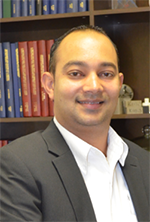 |
Hiten Parmar |
Hiten serves as the Secretariat of Electric Vehicle Industry Association, and Liaison for multiple forums including National Association of Automobile Manufacturers, South African Smart Grid Initiative, South African Bureau of Standards and board member of eNtsa engineering engagement entity. Locally, Hiten is a member of the South African Institute of Electrical Engineers and South African National Energy Association, and internationally a member of the Institute of Motor Industries UK, CHAdeMO Association and Charging Interface Initiative. |
|
|
|
 |
Prof. Ncholu Manyala Chair of South African research chair initiative (SARChI) University of Pretoria |
Prof. Ncholu Manyala is Professor of Physics and Chair of South African research chair initiative (SARChI) in Carbon Technology and Materials at the University of Pretoria, South Africa. Prof. Manyala got his PhD from Louisiana State University working in low temperature transport and magnetic properties of strongly correlated materials where he published two papers in Nature and one in Nature Materials in this field. Prof. Manyala’s recent research interest is on nano-carbon based materials and their applications in energy storage and sensing. Prof. Manyala has published more than 80 papers in this subject. Prof. Manyala is the member of International Society of Electrochemistry, South African Microscopy Society and South African Institute of Physics. |
|
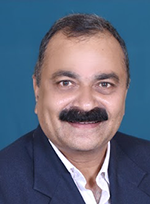 |
Dr. G. H. Jain |
Dr. Gotan Hiralal Jain is presently working as Principal at S.N.J.B.s K.K.H.A. Arts, S.M.G.L. Commerce and S.P.H.J. Science College, Chandwad, India. He is actively involved in the field of research for last 20 years. He completed his Ph.D. in 2007 and the topic for his studies was metal oxide semiconductor Gas Sensors. His areas of interest in field of research are thin and thick films gas sensors, study and synthesis of nanomaterials by various techniques especially for gas sensing applications.So far, his, more than 70 research papers have been published in the journals of international repute. He has presented the research papers in several international conferences across the world.During presenting papers internationally, five times he has been awarded for oral/poster presentations in various national/international symposia. |
|
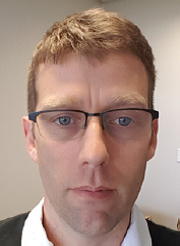 |
Prof. Bladergroen |
Prof. Bladergroen, a former student at the University of Twente in the Netherlands joined the University of the Western Cape (UWC) in 1998 as a PhD student and was appointed as research manager for industrial contract research in 2005, followed by a senior lecturer appointment in 2006. From 2007 Prof Bladergroen accepted his role as the deputy director of the South African Institute for Advanced Materials Chemistry (SAIAMC) at UWC. Prof Bladergroen is currently heading the Energy Storage Innovation Laboratory (ESIL) which was launch in 2015, focused on electrochemical energy storage systems, which includes the development of Li-ion, NaFeCl2 and NiFe batteries. ESIL was created as a platform to commercialize emerging technologies in partnership with local businesses. |
|
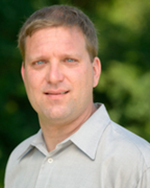 |
Bryant Polzin |
Bryant Polzin has worked at Argonne National Laboratory for the past 9 years in research and development of lithium ion batteries for transportation applications. He is currently splitting his time as Deputy Director of the ReCell Center (DOE’s Advanced Battery Recycling Program) and the Cell Analysis, Modeling and Prototyping (CAMP) Facility. For the ReCell center he is providing technical guidance, program support and outreach. In his CAMP facility work, he has focused on materials evaluation and the scale up of batteries from coin cell level to xx3450/xx6395 pouch cells and 18650 can cell level. He has a number of publications covering different aspects of lithium ion battery development and performance. Prior to coming to Argonne National Laboratory, Bryant has spent 10 years work in industry. He has spent 5 years working at a start-up company that manufactured sapphire for LED production. He also worked at a machine tool manufacture as a process engineer developing manufacturing processes for a number of industries and on different materials. He holds a M.S. from Illinois Institute of Technology in Materials Science and Metallurgical Engineering and a B.S. from Iowa State University in Ceramic Engineering. |
|
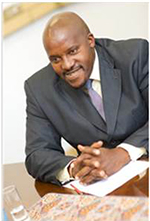 |
Dr M.K. Mathe |
After taking a BS.c (Chemistry) from Elmira College, NY, Dr. Mathe did MS.c. (Chemistry) graduate work at University of Transkei on Water defluoridation. Having received a Ph.D. in Electro-Analytical Chemistry from The University of Georgia where he also became a Research Associate. His research interests include Electrodeposition of Materials, Solar Photovoltaics, Nanotechnology for Hydrogen Storage, Electrocatalysis in Fuel Cells and Energy Storage via, Li-ion Battery Storage technologies for Renewable Energy and Electric Vehicles. Dr. Mathe became a Research Group Leader in the Energy and Processes research group where he became interested in the balance between research and strategies on energy matters. Dr. Mathe later managed the Energy Materials Research Group. His group undertakes research in Electrochemical Energy and Clean Energy Technologies. For the past decade he has directed the Energy Materials research group in the areas of clean coal research, hydrogen storages, electrocatalysis and LIB cathodic materials synthesis and development. Work under his direction has received several R&D and Management awards both at the unit level and organisationally. Currently he also is involved with the National programs of Hydrogen South Africa and Battery Research Centre. Dr Mathe is known as an Energy Champion and Strategy Leader for Research Strategy and Government Policy development for Departments of Science and Technology (DST), Trade and Industry (dti), Industrial Development Corporation (IDC) in South Africa. |
|
